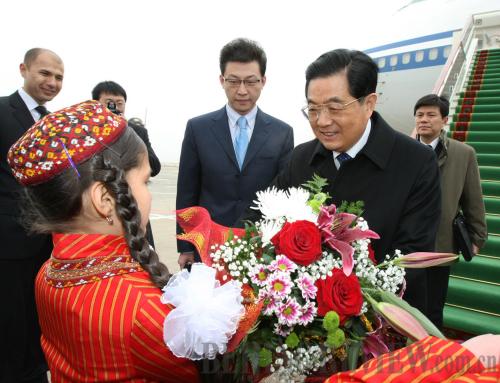|
 |
|
FLORAL GREETINGS: A Turkmen girl presents flowers to Chinese President Hu Jintao upon his arrival in Ashgabat, Turkmenistan, on December 13 (XINHUA) |
The China-Central Asia natural gas pipeline, inaugurated during President Hu Jintao's recent visit to Turkmenistan, is characteristic of increasingly improved cooperation between China and Central Asian nations, according to Chinese analysts.
The 1,833 km-long pipeline runs from the Turkmen-Uzbek border via central Uzbekistan and south Kazakhstan before reaching northwest China's Xinjiang Uygur Autonomous Region. In 30 years, it is expected to supply China with 40 billion cubic meters of natural gas annually.
President Hu proclaimed it a "model of solidarity and mutually beneficial cooperation" between China, Turkmenistan, Kazakhstan and Uzbekistan. Moreover, he noted, the pipeline reflects mutual aspirations to "enhance regional economic cooperation and achieve common development."
Presidents of all four countries were in attendance at the December 14 official ceremony on the right bank of the Amu Darya River in Turkmenistan.
Given the declining demand in Europe, Central Asian countries have increasingly viewed China as a new market for their rich oil and natural gas resources, said Xia Yishan, an energy expert at the China Institute of International Studies.
"China can be a stable buyer of Central Asia's oil and gas," he said. With "China's economic takeoff and growing awareness of environmental protection needs, demand for clean energy [including natural gas] is bound to soar."
China's huge foreign exchange reserves, as well as its geographical proximity, have made it an attractive market for Central Asian energy producers, noted Pan Guang, Director of the Center of Shanghai Cooperation Organization (SCO) Studies at the Shanghai Academy of Social Sciences.
Energy cooperation between the two sides, he added, would allow Central Asian countries to upgrade their non-energy sectors as well. For example, these countries will be able to improve their chemical industry, light industry, agriculture and transportation infrastructure with revenues from oil and gas exports.
Moreover, energy projects, such as the China-Central Asia gas pipeline, can also help create job opportunities and raise local living standards. This, in turn, could contribute to Central Asian countries' efforts to address the "three evil forces" of extremism, separatism and terrorism—security threats looming large in the region.
Beyond energy
President Hu's visit to Kazakhstan and Turkmenistan from December 12 to 14 had "important and far-reaching influence on developing [regional] relations and boosting peace, stability and prosperity," said Chinese Foreign Minister Yang Jiechi.
Overall, China has been consistent in upholding its foreign policy of treating neighbors as friends and partners, he said. This was underscored by the fact that, high on the agenda of Hu's visit, Yang added, were mentions of cultural exchanges and other forms of diplomatic outreach.
During Hu's meeting with Kazakhstan's President Nursultan Nazarbayev, for instance, the Chinese leader pledged to double the number of scholarships annually offered by the Chinese Government to Kazakh students studying in China to 200, up from 100, as of 2010.
In addition, he also called on both countries to ensure that the two Confucius Institutes in Kazakhstan operate smoothly, and that visits of cultural groups between China and Kazakhstan be successful. Beijing has established Confucius Institutes worldwide to promote Chinese language and culture.
Similarly, Hu announced China's intention to double the number of government-sponsored scholarships for Turkmen students in China from 45 to 90 as of 2010, during a meeting with Turkmen President Gurbanguly Berdymukhamedov.
In a similar vein, Hu donated books on Chinese language teaching as well as China's history, geography and culture to the National Library of Turkmenistan.
Both leaders also underlined the importance of cooperation in culture, sports, education, journalism, health and tourism. These were discussed in the context of increasing contacts between the two countries' art groups, NGOs, media organizations and academic institutes.
Hu went on to assure Uzbek President Islam Karimov at their meeting in Turkmenistan that Beijing is ready to work with Uzbekistan to run the China-Central Asia natural gas pipeline amid a safe environment—while vowing to expand the two countries' overall cooperation in oil and gas.
Further, Hu expressed a need to go beyond energy to collaborate in the fields of economy and trade, transportation, telecommunications, light industry and agriculture.
The leaders of the three Central Asian nations pledged to work with China to address regional security threats, both bilaterally and within the framework of the SCO—a regional organization grouping China, Russia, Kazakhstan, Kyrgyzstan, Tajikistan and Uzbekistan. | 